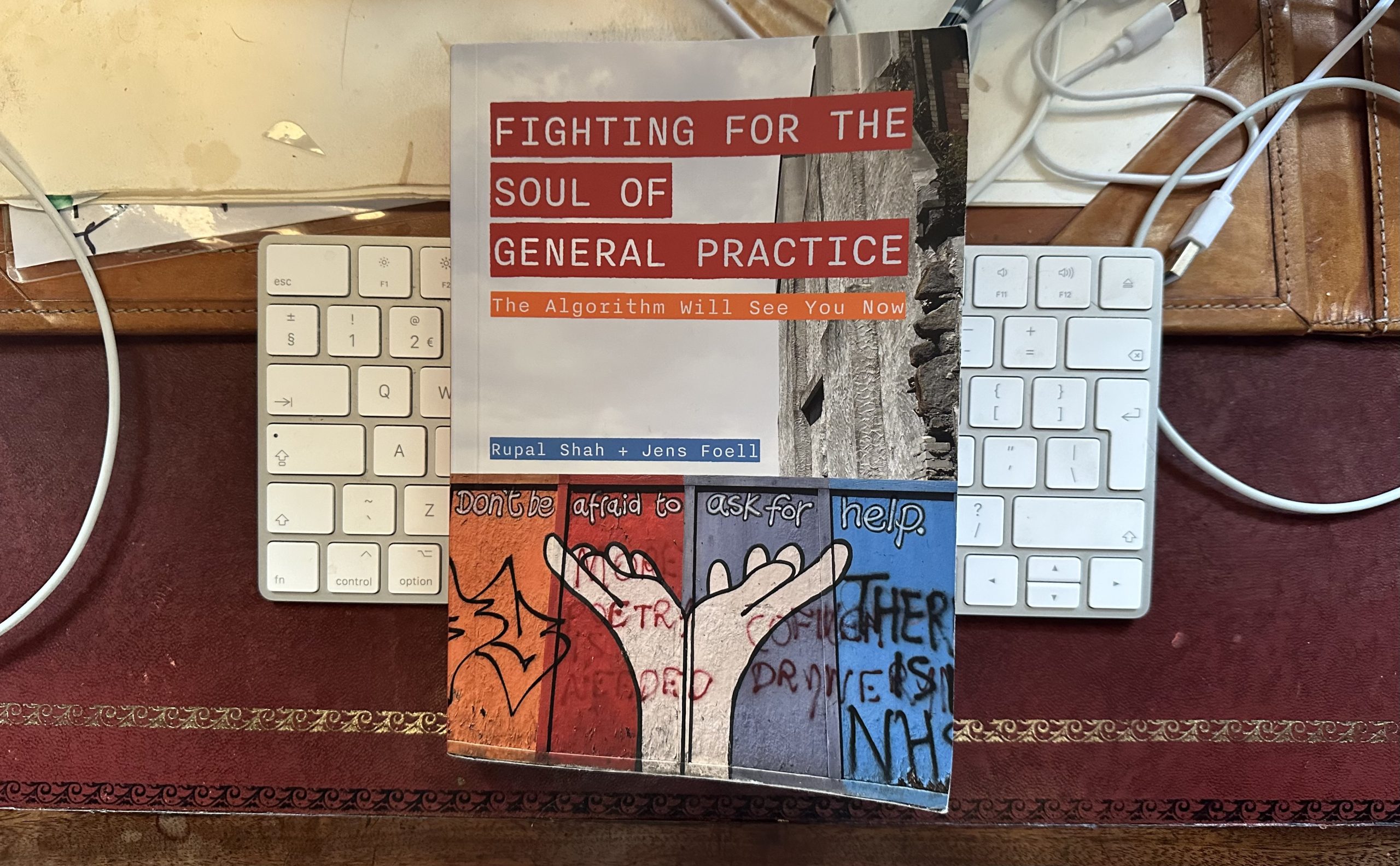 Andrew Papanikitas is the Deputy Editor of the BJGP. He is on X: @gentlemedic
Andrew Papanikitas is the Deputy Editor of the BJGP. He is on X: @gentlemedic
In this remarkable book, two GPs offer a narrative account of the daily realities of British urban general practice and reflect on the unsettled philosophy, psychology and phenomenology of GP life. Rupal Shah and Jens Foell reflect on their authentic stories with scholarship and cultural memes. We are invited to empathise with moral distress that they experience as GPs attempting to be human in an increasingly computerised and standardised healthcare system. The professional environment is one of austerity combined with a system that is bureaucratic and target-driven. The authors describe GPs as ‘street level bureaucrats in that we simultaneously enact the dictates of ‘tyrannical officialdom’ whilst addressing the needs of our clients. The text feels like a conversation – Of course bureaucracy exists as a safeguard against exploitation by those in power they tell us whilst raging against the machine- and the authors caution the reader that life and language are nuanced. The reflections on each case blend practical wisdom with scholarship that ranges from intellectual heroes of general practice such as Julian Tudor Hart and David Armstrong to the philosophers whose work describes and/or underpins out social reality, from Thomas Hobbes to Miranda Fricker.
The authors describe GPs as ‘street level bureaucrats in that we simultaneously enact the dictates of ‘tyrannical officialdom’ whilst addressing the needs of our clients.
The memes used are also powerful ones, and I do not doubt that they might entice more than a few people to blow the dust off an old DVD and re-watch an old movie classic as a form of professional therapy, eyes now open to the richness and applicability of the subtext. Towards the end of the book, I am haunted by the piece of quoted movie dialogue from 2001: A Space Odyssey. A spaceship’s sentient computer calmly states that it will not allow an astronaut back aboard from the void and then politely ends the conversation as it no longer serves any purpose. It makes me think of the close of a 10-15 minute consultation – healthcare protocols dictate that the patient, still distressed, must leave the room now. Imagine a calm slightly androgynous voice saying, ‘Dave, this conversation can serve no purpose anymore. Goodbye.’ Sadly, there is not yet an audiobook, but there is an ‘in conversation’ podcast series.
The book is believably rich in common and plausible (being based on experience) general practice narratives. With apology and credit to the authors I fully intend to ‘mine’ it as sourcebook for teaching, and as a text to recommend to sixth formers, medical students, foundation years and GP trainees. Even on page one, we are challenged by our duties to a homeless man who tacitly asks health centre staff for food and shelter in addition to healthcare. As well as narratives to trigger an ethical discussion, there are other social, psychological, ground-level political and more broadly philosophical ideas that are brought to life. Perhaps it is better to say that they emerge from the narratives. I am both amused and ashamed by the idea that we are medicating for poverty and its attendant distress – the question, ‘How much money would you need if I were able to prescribe money instead of antidepressants and painkillers?’ (page 45) is one that has international resonance. The stories here have the advantage of being plausible archetypes. For the most part each story is not a factual description of a specific real person but constructed out of the authors encounters with real people. As a medical teacher I am grateful for the index which allows the reader to access narratives via the intellectual tools that the authors expertly apply in their reflections.
…the question, ‘How much money would you need if I were able to prescribe money instead of antidepressants and painkillers?’ (page 45) is one that has international resonance.
Taken as an entire scholarly work (a thesis) the book is a scholarly travelogue of day-to-day activities in general practice from the practitioner’s viewpoint*, and as such it can be a lingering and emotional read. I am reminded a little of In that Case (1982), by Roger Higgs and Alastair Campbell (A book written by a GP and a philosopher that used the care narrative of an inner city family to unpack medical ethics) though this has some of the spirit of Road to Wigan Pier. The GP reader connects with the narrative archetypes of current practice in the stories. I feel as I read, it is both familiar and strange. You don’t have to feel what the authors are feeling but the stories and the reflections on them are relatable to general practitioner, and potentially to other kinds of street-level bureaucrat. Whilst the context is of the book is very British, I invite colleagues in primary care and other street-level professions to consider that like a good ethnography much of the narrative and subsequent reflection is transferrable. It does not feel glorious, glamorous, or safe, the authors are quick point out that the rural general practitioner John Eskell idolised in John Berger’s book ‘A fortunate man,’ took his own life. I have a slightly different reaction to Iona Heath’s claim that it will make me ‘fall back in love with the job’ on the back cover – we are free to react differently-, and you may also be changed in a yet different way should you read the book. It may help me find words for my moral distress and reassure me that I am sane when I fail to fathom the system. It may allow me to remain in love with the job (and there are many shades of love) in the knowledge that the job is not wrong in any fundamental way but besieged by perverse and morally toxic social currents. It may help me to navigate these currents more safely in practice and consider how to sustain or even ‘forgive’ a career in General Practice long enough for things to improve. It also, though language and knowledge and through a shared story, gives me some of the moral agency I need to fight for the should general practice myself. Fighting for the soul of general practice feels like a strong manifesto for the human and humane aspects (the soul) of general practice.
Featured book: Rupal Shah and Jens Foell, Fighting for the soul of general practice: The algorithm will see you now, Intellect books, Bristol, Jan 22, 2024, https://www.intellectbooks.com/fighting-for-the-soul-of-general-practice, ISBN 9781789388398, Paperback, 258 pages, £19.95
*Deputy editor’s note a sample of this is available on publisher’s website here: https://intellect.stisonbooks.com/media/Labour-of-Love.pdf [accessed 19/7/24]
Featured photo by Andrew Papanikitas, July 2024







CONGRATULATIONS!